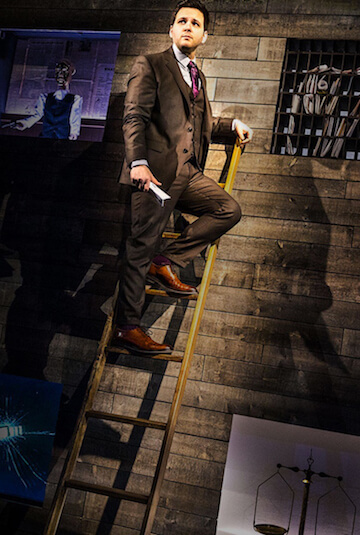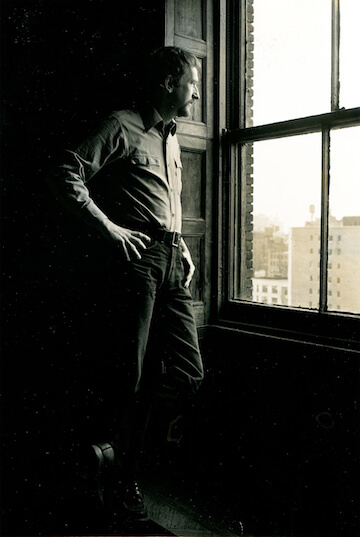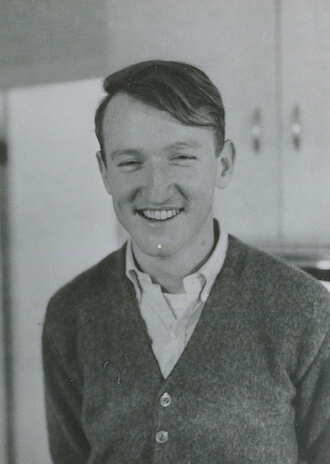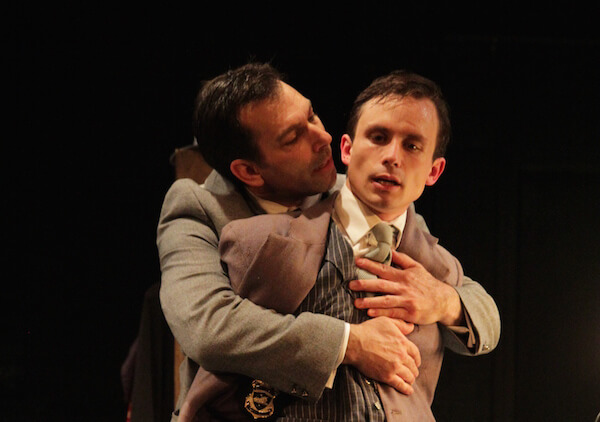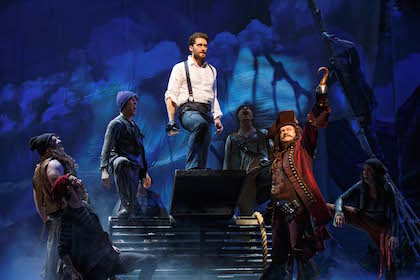Adam Chanler-Berat and Phillipa Soo in Craig Lucas’ “Amélie,” with music by Daniel Messé, lyrics by Messé and Nathan Tysen, and directed by Pam MacKinnon. | JOAN MARCUS
The new musical “Amélie” would be perfect for a first date. It’s endearing, not too demanding, and with the magnificent Phillipa Soo in the title role stages a charm crusade that is nigh irresistible.
That may seem like damning with faint praise, but “Amélie” makes little pretense of having big ambitions. Rather, it seems designed to divert and enchant on a small scale. It’s a gem, albeit an imperfect one.
I had never seen the movie on which the musical is based, so the story of a shy, young woman who lives to do good in the world while not drawing any attention to herself was new to me. As a child, Amélie lost her mother, lived in an overly protective world, and used her outsized imagination as a coping mechanism. As an adult, she moves to Paris, works in a bistro, and quietly helps people. Whether finding ways to instill confidence in a fledgling writer or urging on a tentative relationship, she stays well in the background unknown and unacknowledged, living a solitary life. Her neurosis (though that seems such a strong word for this gentle, well-meaning creature) is so internalized that when she is confronted with the potential for real love, she’s terrified and pretty much immobilized. To a greater or lesser degree, many of us can relate to that.
The story is told in a series of set pieces that establish the character. Ultimately, she encounters an artist, Nino, and throughout the course of trying to get his lost work back to him, falls in love. How Amélie conquers her fear and takes a chance on being vulnerable consumes the second half of the show. As I said, great for a first date.
Craig Lucas’ book captures the sweetness of the tale, though it takes a while to get going; the exposition is complicated. The music by Daniel Messé is pleasant if not memorable, but the lyrics by Messé and Nathan Tysen are often extremely clever and insightful, their seeming innocence delightfully belied by sophisticated rhyme and meter.
Any reservations one might have about the structure of the show, however, are more than compensated for by Soo’s performance. She plays Amélie as a gamine with a pixie-like charm and sense of humor that offset her darker side. She sings with delicacy and flawless technique that send chills of pleasure up one’s spine. Adam Chanler-Berat is perfectly cast as Nino. He has an appealing presence that is part innocence, part passion and manages to be both challenging and non-threatening to Amélie. If anyone can bring this bird to light, it’s him. Chanler-Berat has an excellent voice and an inherent earnestness that work throughout. The rest of the company fills a variety of roles very well.
The sets and costumes by David Zinn evoke Paris, though the show as written doesn’t seem too intensely French, presumably by design. Pam MacKinnon has directed with delicacy and humor appropriate for this tiny tale.
Clocking in at an hour and 50 minutes without intermission, the show knows not to overstay its welcome. In a world of muscular musicals, the delicacy of “Amélie is decidedly welcome – but much more and it might start to cloy. That said, when Amélie is finally able to experience a little of the joy she brings to others, it’s a hard heart indeed that would remain untouched.
“The Play that Goes Wrong” portrays either every producer’s nightmare or every 11-year-old boy’s idea of the pinnacle of comedy. I’ll go with the latter, and my internal fifth grader had the most wonderful time at this screwball comedy where each successive screw-up provokes gales of laughter. The moral is that when everything goes wrong, the best thing to do is laugh, and when we’re talking Broadway, rather than politics, it’s a much-needed tonic.
Henry Lewis, Jonathan Sayer, Henry Shields, and David Hearn in Lewis, Sayer, and Shields’ “The Play that Goes Wrong.” | JEREMY DANIEL
The production by Mischief Theatre is about a college theater troupe staging a murder mystery from the 1920s. Mayhem ensues. It is some of the most hilarious mayhem you’ve ever seen on a stage, and to give away too much would be to wreck the fun. To call it a “door-slamming farce” is the most egregious understatement. It starts with a door and falls apart from there. The piece recalls the very best of Monty Python in terms of witty silliness and gonzo slapstick. Playwrights Henry Lewis, Jonathan Sayer, and Henry Shields started with the idea of all the things that could go wrong in a play — and then never stopped. By the end of the first act, sides aching from laughter, one wonders how they could possibly up the ante… and then they do.
The company is absolutely smashing, especially at smashing. The physical comedy is gasp-inducing hilarity with absolute precision. At the same time, the determination of the characters to capture the 1920s spirit is artfully inept and amateurish. Watching the characters try to regain the artifice as their lives are in real and constant danger is part of the fun, particularly when it’s obvious these actors are playing amateurs hearing the response of an audience for the first time or when a stage manager gets caught on stage and sees the audience. These clever bits humanize the situation and let us empathize with the poor actors caught in an epic disaster. Humanity is essential to this piece’s success; otherwise all the goings-on might seem mean-spirited. Instead, this is classic comedy as the hapless heroes undergo outrageous fortunes.
Pretty much everyone who has ever appeared on a stage has stories of the odd thing that goes wrong in a production, how they got through it and lived to tell the tale. Now imagine every single one of those stories in one show, and you begin to get the idea. Over the years, I’ve observed that shows often fall apart in the second act. I’ve never before meant it as the highest praise.
Derek DelGaudio in “In & Of Itself,” directed by Frank Oz, at the Daryl Roth Theatre through June 18. | INANDOFITSELFSHOW.COM
I’m the perfect audience for illusionists. I love how they play with our perceptions, and I never want to know how it’s done. It’s the only situation in which I like being tricked or played with. In college, I had a roommate who was a sleight-of-hand magician, and I would sit at our kitchen table watching for hours as he practiced.
“In & Of Itself” is a perfect show for someone like me. It combines an engaging story about how one man became an illusionist with a variety of mind-bending tricks that are nothing short of dazzling. Like “The Object Lesson” earlier this year, the illusions appear in the context of larger story and make the mechanical theatrical. In this case, the overarching theme is how we find out identity, how events shape us, and how we respond and grow.
Written and performed by Derek DelGaudio and directed by Frank Oz, the show is warmly philosophical, with the illusions woven into DelGaudio’s story. He is the opposite of a stage magician; his style is understated and honest, rather than flashy. All the better to make the illusions more surprising.
DelGuadio’s illusions are diverse — close-in magic, vanishing, and predicting, for instance. He says that as a young man he set out to learn a range of tricks from the best people he could find. It was the antidote to a challenging childhood, and we are the better for his determination and skill. The best trick of all, though, is the artful way DelGaudio weaves all of this together into a compelling piece of theater.
AMÉLIE | Walter Kerr Theatre, 219 W. 48th St. | Tue.-Thu. at 7:30 p.m.; Fri.-Sat. at 8 p.m.; Wed., Sat. at 2 p.m.; Sun. at 3 p.m. | $49.50-$169.50 at ticketmaster.com or 866-745-3000 | One hr., 50 mins., no intermission
THE PLAY THAT GOES WRONG | Lyceum Theatre, 149 W. 45th St. | Tue.-Thu. at 7 p.m.; Fri.-Sat. at 8 p.m; Sat. at 2 p.m.; Sun. at 3 & 7:30 p.m.; $30-$139 at telecharge.com or 212-239-6200; Two hrs., with intermission
IN & OF ITSELF | Daryl Roth Theatre, 101 E. 15th St. | Through Jun. 18: Tue.-Sat. at 8 p.m.; Sat. at 3 p.m.; Sun. at 3 & 7 p.m.; $58-$248 at ticketmaster.com or 866-745-3000; One hr., 15 mins., no intermission

